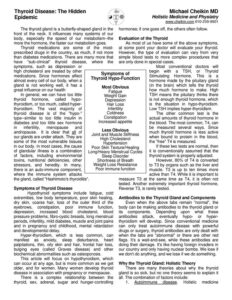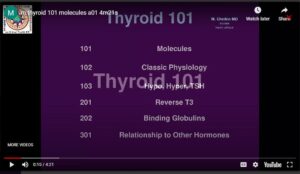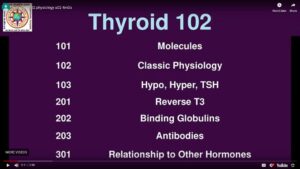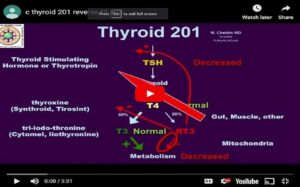Thyroid Testing: Comprehensive
Updated April 5, 2024
Thyroid Program
IMPORTANT NOTICE
This information is for educational purposes only, to facilitate quality conversations between patients and their personal physician(s). Several essential considerations are required to safely administer any protocol for an individual. This information is NOT intended to diagnose, treat or encourage self-treatment of any medical condition.
Thyroid treatment, including Hashimotos, Graves, Thyroid Cancer, and other forms of dysfunction, requires looking at a complete panel of thyroid labs as a whole. For example, we have seen hundreds of patients who have low T4 free and total, low T3 free and total and low Reverse T3. While classically TSH should be high, in these cases the TSH was very low. This incompatibility is not addressed by conventional endocrinologists, though it is discussed in ALL textbooks of endocrinology going back to the 1970s and before. This condition, low thyroid hormones with low TSH is called secondary or pituitary hypothyroidism (for those more detail-oriented, this can also be tertiary, caused by hypothalmic dysfunction).
Based on a complete panel, we can monitor the response to the considerations outlined below. Please remember: this information is for educational purposes only, to enable you to have a quality conversation with your doctor who is prescribing the tests and medications. This list is not in order of priority. Several additional considerations are required to design this panel for an individual:
Based upon the ongoing evaluations listed above, treatment protocols are formulated to address the most fundamental blocks to holistic health (usually co-existing deficiencies and toxicities). Clearly when any of the above tests reveal significant results, the prognosis for holistic healing improves.
Comprehensive Thyroid Panel Components
- All available thyroid hormone measurements including: Free and Total T4, Free and Total T3.
- Reverse T3, while rarely measured by conventional physicians, may be the most important measure of balance of thyroid medications since it reflects thyroid, adrenal and bodily function.
- TSH (Thyroid Stimulating Hormone), while the primary measure used to assess thyroid levels by conventional physicians, is made by and reflects pituitary function (and dysfunction) and may not reflect bodily need.
- Thyroid Antibodies including Anti-TPO, anti-Thyroglobulin, and when the question of Graves is raised, anti-TSH receptor (TSI).
- Thyroid function is also measured via thyroglobulin levels. Thyroglobulin is a polymeric form of thyroid hormone made and stored by the thyroid gland. There is a suggestion that slightly elevated thyroglogulin can be a sign of iodine deficiency. Very high levels are a biomarker of potential thyroid cancer, and are used to monitor cancer patients for recurrence.
- Minerals including selenium, zinc, magnesium and others that are known to directly or indirectly influence thyroid function. When possible, they are measured in several compartments, such as serum, cellular (RBC), urine, and by provocation (see below).
- Ferritin and iron levels.
- Bile Acids and Taurine levels give us a rough handle on thyroid conversion, as both are needed to convert T4 to T3 (a fact missed by many thyroid “experts”).
Amino acids including tyrosine as a measure of sufficient nutrient. - Adrenal hormones and sex hormones are closely related and should be checked, though the values have some quirks. Don’t forget that ALL hormones exert some or most of their work at the cellular level, and therefore measurements in blood, saliva, or other tissues may not be valid for understanding and changing physiology. The adrenal and related sex hormones measured include: DHEAs, Pregnenolone, Testosterone (free and total), and Sex Hormone Binding Globulin. Sometimes estrogens are helpful in men and less-so in women, but occasionally help in understanding trends in the individual’s pathways.
- Thyroid Binding Globulin (TBG) values. All binding globulins (including the ones mentioned below) are influenced by every other hormone. For example, birth control pills (and female hormones in general) raise Cortisol Binding Globulin (CBG). In that context, it is important to measure free, total and calculate percent free as a biomarker for this functional realm. Other binding globulins include Sex Hormone Binding Globulin (SHBG) and Albumin. Insulin is also bound but I have not been able to find reference to a specific binding protein. Insulin does bind to Albumin.
- Inflammatory and other autoimmune markers,
- Celiac gene testing. This test can detect potential gluten issues. The standard antibody requires ongoing exposure to gluten and the ability of the body to mount an antibody response.
- Lipid panel, as this can be influenced by thyroid function.
- Iodine and other halides (bromide, fluoride and chloride). We start with conventional lab testing then move to challenged testing.
- Infectious antibody titers to Lyme, Epstein Barr and Candida, as all can mimic and influence thyroid dysfunction. The antibody requires the ability of the body to mount an antibody response; therefore a negative test (absence of antibody) might be a false negative.
- Heavy metals such as mercury and lead, known to directly and indirectly influence thyroid function
- Trace Mineral levels using private labs can measure elements not available with conventional labs. These include boron, chromium, vanadium, manganese, molybdenum, strontium, lithium (nutritional) and others. Challenges with provoking agents can provide information about deeper stores.
- Stress and psycho-spiritual factors and practices that can affect sleep and autonomic function.
- Electro-Magnetic Field toxicity which in some sensitive people can be important.
- Other factors that we are continuously identifying, such as chronic yeast, other stealth infections, and toxins such as glycophate, perchlorates and “hormone disruptors“, many of which can’t yet be tested in patients.
Based upon the ongoing evaluations listed above, treatment protocols are formulated to address the most fundamental blocks to holistic health (usually co-existing deficiencies and toxicities). Clearly when any of the above tests reveal significant results, the prognosis for holistic healing improves.





